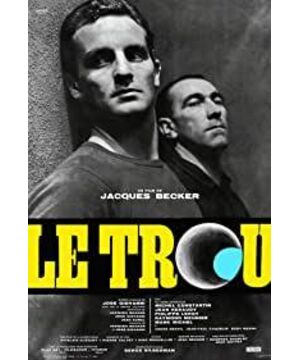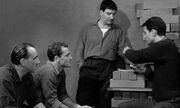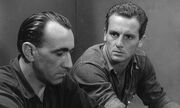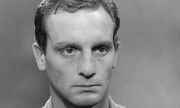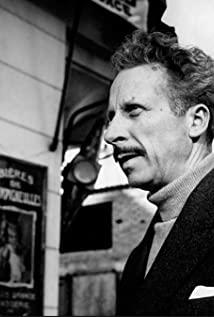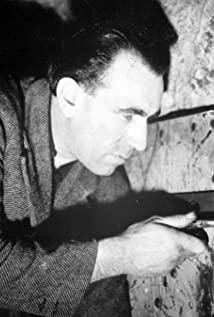Because I have seen "Prison Break" and "Xiao" before, although she is a girl, she is still deeply attracted by this kind of movie with a tight plot, so when I saw that this movie is the originator of prison break, I decided to look for it. I watched it, originally a good movie should be enjoyed in the middle of the night with the lights turned off and alone, but I have been too busy at work recently, so I couldn't help but put the office computer in the smallest window to watch it. I am also a master of movie reviews after watching movies, and I think it is necessary to share with everyone after watching movies. However, after watching the movie, I felt very exciting, and after watching the film review, I felt... quite confusing, with all kinds of speculations, all kinds of conjectures, all kinds of Sherlock Holmes, and I was deeply drunk. Wikipedia's introduction to the movie's plot https://en.wikipedia.org/wiki/The_Hole_ (1960_film) (very brief, but at least I won't say anything about Roland's betrayal after reading it) First look at the cast list : Marc Michel - Claude Gaspard Jean Keraudy - Roland Darbant Philippe Leroy - Manu Manu Borelli Michael Constantine Michel Constantin - Geo Cassine Raymond Meunier - "Your Excellency" Monseigneur, Vossellin About Roland's actor Gene Keelty, a passage in Wikipedia is introduced, for the convenience of everyone Check it out, I've excerpted it below: ( https://en.wikipedia.org/wiki/Jean_Keraudy) Jean Keraudy was the stage name of Roland Barbat. He was one of five inmates involved in a 1947 escape attempt from France's La Santé Prison. He served as the inspiration for the character of Roland Darbant in José Giovanni's 1957 novel The Hole (French:Le Trou). The two met while cellmates at La Santé. In the 1960 film production of The Hole, director Jacques Beckercast him to play Darbant. He died in 2001. Translated, Gene Cellmates is Roland Barbat's stage name, Roland Barbat One of five prisoners who attempted to escape from La Santé prison in France. José Giovanni's 1957 novel "The Hole" (French: The role of Roland Darbant in Le Trou) was inspired by him (Roland Barbat), who José Giovanni and Roland Barbat met in La Santé prison. In the 1960 film "The Hole", director Jacques Becker asked him (Roland Barbat) to play the role of Roland Darbant. So the car mechanic at the beginning of the movie did not appear as the BOSS in the prison break, Roland Darbant, but the Roland Barbat in real life, which is the prototype of the movie and novel. Normally, he should be released after serving his sentence, otherwise the director will not Dare to be so willful and ask him to act in a movie again. And our tech guy Roland It is entirely possible that Darbant is planning another escape from the prison at this moment, just pray that he will never meet a little white face again, Amen. So, without the director's painstaking foreshadowing, and without the warden's painstaking arrangement to incite a prison breakout to make political achievements for himself (I was really drunk when I saw this kind of speculation by the bean friends...), we can completely Think of the opening part of the movie as the opening theme of the TV series, just skip it. So the plot of the movie doesn't seem to be as mysterious as everyone is discussing. It is fascinating with a tense plot, not a complicated plot. It is a crime drama, not suspense. There are also many friends who have to compare it with "Shawshank", which really makes me incomprehensible. It's like comparing the taste of an orange with an apple. What's the point. At the beginning of the movie, Gaspard is summoned to the warden for having a gilded lighter in his possession, and the warden's sympathy for him should be due to Gaspard's politeness (mainly The contrast is too strong, it's really the uncle who was on hunger strike in front of him too... what, he's childish, sorry I can only think of this word to describe it, I won't eat if I don't eat, it's really enough for the warden to be upset), After that, he got confused and went the wrong way. The warden could recognize him. I think it should be the impression left by the gold-plated lighter. In a place like prison, it is difficult for people to shine, only gold. The digging plot is no longer narrated here, only two words are written, and I feel the same. The following mainly talks about a few small points in the movie: The plumber was reinvited by Greenwald to send it to the prisoners because he stole cigarettes and stamps. This is a key point. The reason why I say it is a key point is because it It is both a need for the plot (to give the audience a sense of tension, a sense of empathy for the audience, worry about whether the prisoner has been exposed), and it also gives the author a reasonable explanation for arranging the generation of the betrayer. We saw that when the head of the building went to call the plumber, Gio was completely eager to try, he stretched his limbs and said, now we are going to move, he is ready to fix those two guys, his tone is his The look tells you how natural violence is to him. At this time, as an audience, do you really hope that such a person can escape from prison and get out of control? Let's take another look at Gaspard's expression when Gio shoved a cigarette into one of the plumbers' mouths and slapped him hard, a completely different expression than the rest of the cell, shock and shock. Fear, so the betrayal can only be him, not anyone else. Of course, talking about good people and bad people in a crime film is a little naive. After all, the director's skill is so strong that everyone who watches the film thinks that they are running for their lives, so we don't have to worry about them. How bad was it before, and whether escaping would harm society and so on. We only need to know that people are multi-faceted, there is no absolute good person, and there is no absolute bad person. I believe that Gio is a dutiful son, otherwise he will not give up his escape, and I also believe that Manu is a loyal Chinese paper, otherwise he will not Will retract their heads sticking out of the ground and say we'll go down and pick them up. As for the arrangement of the scene where Gaspard came back from the reception room and ran into the wrong room, I think the director mainly wanted to express the upset mood of Gaspard at the time. Saying that I'm going to England, to learn English, my god, it's a rhythm of wanting to walk away, look at Gaspard's performance after listening to these words, and say something dear, don't play with me, I'll be very happy It was uncomfortable, but I already knew in my heart that I had been tricked. Then came the surprise inspection, which should not be targeted. If it was intended to target them, it would be more than simply kicking the cardboard box, but this surprise inspection accelerated the development of the plot and made them understand that the escape trend It must be done and must be resolved quickly, otherwise there will always be hidden dangers of being discovered. That night they pierced the sewer pipe, and Gaspard and Manu went through the manhole to see the early morning in Paris, France. They decide the order in which they go out by casting lots, and Gio announces to everyone that he will not go with everyone, that he will stay. Gaspard was taken away by Greenwald, and anxiety filled everyone's heart. What do we fear most when we are implementing a plan? are variables. Whether it was Gio's refusal to leave or Gaspard's being taken away, it was a big change for the nervous prisoners at the moment, and it was a great deal of unease. Gaspard was brought back two hours later, and as soon as he entered the door, he confessed to everyone that her wife had withdrawn the case. This urgent statement felt completely different from the way he came back after seeing his lover in the reception room. I don't know if you have any. Without seeing his unnaturalness, people often behave like this when they cover up something, either silently or eloquently. Many people can't accept Gaspard's betrayal after watching the movie, and some people think it was used by the warden. Regardless of whether he is being used or not, let's take a look at his psychology. From the conversation between him and the warden alone, we can get a glimpse of his psychology: "Actually, my wife and I were quarreling, and she threatened me with a gun. I wanted to take the gun and take the fire and injured her. I really hope it hurts. It's me, but fortunately she's recovering quickly" "Is it recovering quickly?" "Well, she's in good health now." His descriptions have been downplaying his guilt, as if he was in prison only because of a feud. In fact, everyone knows what happened. From this we can be sure that he certainly Hoping to get out of jail through his wife's withdrawal and the court's forgiveness, not through that dark hole as an outlaw. And then when the warden told him that her wife had withdrawn the case yesterday, he was overjoyed and said immediately, "Then I can be released!" It doesn't matter whether the warden's dismissal of the case is true or not, the important thing is that we know what Gaspard has in mind, and we are willing to choose what to believe in what people expect. Finally, I want to say that the quality of a movie is not about how many mysteries it contains, and watching a movie is not a guesswork. We don’t really need to go to the dialysis, just sit down and enjoy it quietly.
View more about Le Trou reviews


